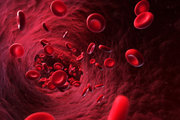Pavilion Publishing and Media Ltd
Blue Sky Offices Shoreham, 25 Cecil Pashley Way, Shoreham-by-Sea, West Sussex, BN43 5FF, UNITED KINGDOM
 Researchers have developed an experimental treatment to overcome resistance to drugs used to treat cancers of the blood.
Researchers have developed an experimental treatment to overcome resistance to drugs used to treat cancers of the blood.
So far, the drug has shown promise in pre-clinical studies in mice and is expected to enter clinical trials later this year.
Cancer Research – which part-funded the research – said the findings have the potential to be a “game-changer” for people with blood cancers – such as certain types of leukaemia and non-Hodgkin lymphoma. But the charity stressed that human studies need to be completed first.
In recent years, drugs made from engineered immune proteins – called monoclonal antibodies – have vastly improved treatment for several types of cancer.
They work by sticking to specific proteins found on the surface of cancer cells. This can affect cancer growth in several ways, but importantly they can attract the attention of the body’s immune system to attack the cancer.
Unfortunately, patients can go on to develop resistance to these drugs, so researchers have been trying to understand the molecules and mechanisms involved.
The new study, published in the journal Cancer Cell, and carried out by researchers based in Southampton, Sweden and the Netherlands, showed that one way resistance develops is when cancer cells become able to draw monoclonal antibodies inside themselves, making them invisible to immune cells.
This led them to develop a new antibody – called BI-1206 – to prevent this drug destruction process and enhance cancer killing by binding itself to another molecule, which prevents it from being internalised.
The process showed success in mice in overcoming resistance to antibody drugs such asrituximab (Mabthera), which is used to treat different types of lymphoma and leukaemia.
Professor Mark Cragg, who led the study, said: “Not only does BI-1206 appear to be able to reverse resistance to a range of monoclonal antibodies, it is also effective at directly killing cancer cells itself.”
Dr Emma Smith, senior science information officer at Cancer Research UK, said: “This exciting research has the potential to be a game-changer for people with white blood cell cancers that don’t respond, or have stopped responding, to treatments like rituximab.
“It could also make immunotherapy for other types of cancer more effective too. The work was carried out in mice, so we’ll have to wait for the results from clinical trials to find out if the treatment is safe and effective in people, but it’s certainly a promising approach and could lead to more potent drug combinations that benefit patients.”
Around 38,000 people of all ages are diagnosed with blood cancers and related disorders every year in the UK.


